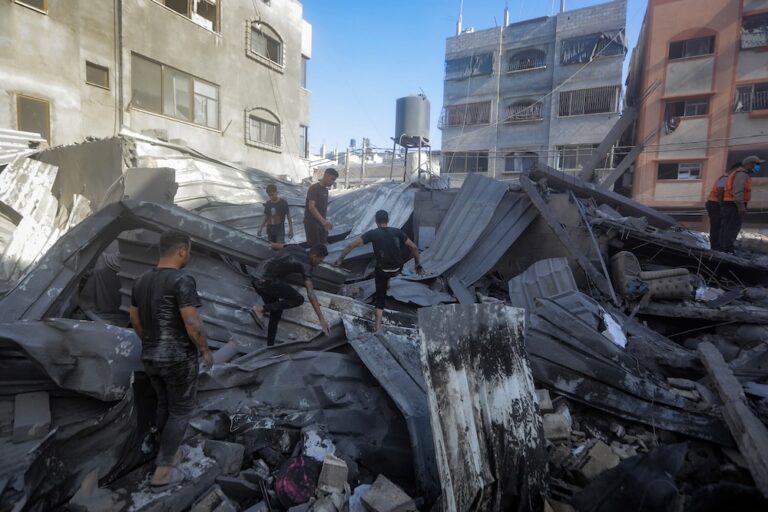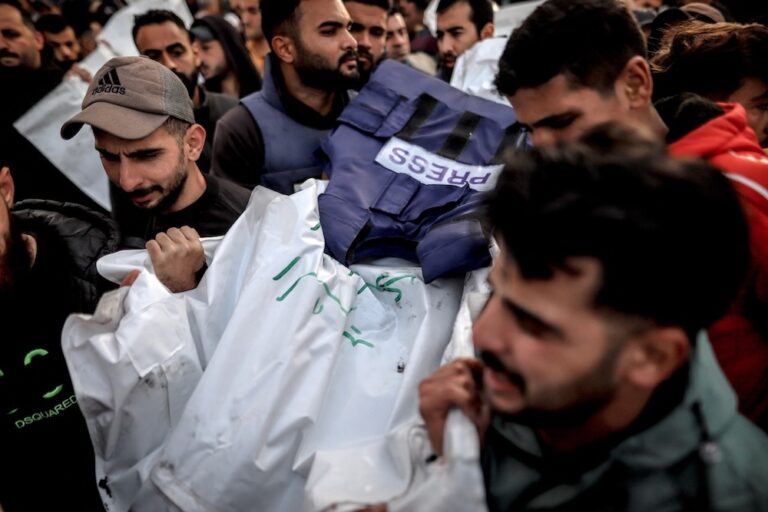(CPJ/IFEX) – The following is a 25 October 1999 CPJ press release: **Updates IFEX alerts of 22 October 1999, 4 August and 11 May 1998** For Immediate Release Palestinian Journalist Describes Harassment, Restrictions on Free Movement New York, N.Y., October 25, 1999 – The Committee to Protect Journalists (CPJ), the New York-based independent press freedom […]
(CPJ/IFEX) – The following is a 25 October 1999 CPJ press release:
**Updates IFEX alerts of 22 October 1999, 4 August and 11 May 1998**
For Immediate Release
Palestinian Journalist Describes Harassment, Restrictions on Free Movement
New York, N.Y., October 25, 1999 – The Committee to Protect Journalists
(CPJ), the New York-based independent press freedom group, is distributing
the personal account of Palestinian journalist Taher Shriteh, a veteran
Gaza-based reporter for The New York Times, the British Broadcasting
Corporation, and the Japanese daily Yomiuri Shimbun, who has been banned by
Israeli authorities from traveling to Jerusalem and the West Bank.
Shriteh has been denied Israeli permission to visit Jerusalem and the West
Bank since March 1995, effectively barring him from gathering news outside
Gaza and from meeting with current and prospective employers. CPJ believes
that these measures have been taken in reprisal for Shriteh’s years of
reporting about the activities of the Islamic Resistance Movement (Hamas) in
Gaza.
Shriteh has never been tried or convicted of any crime, and Israeli
authorities have never provided any explanation for the harsh restrictions
on his movements.
Last week, Shriteh learned that Israeli authorities had rejected his
application for a permit to travel via the safe-passage route between Gaza
and the West Bank which officially opened today. No reason was provided for
the decision. He was also forbidden to use the Israeli security-escorted
shuttle bus service that operates between Gaza and the West Bank to
transport people barred from entering Israel.
In a letter to Prime Minister Ehud Barak on October 21, CPJ’s Executive
Director Ann K. Cooper urged the Israeli leader to “ensure that current
restrictions on Mr. Shriteh’s freedom of movement are lifted immediately, so
that he may carry out his professional work in Jerusalem and the West Bank
without further interference from Israeli authorities.”
Shriteh is one of the most accomplished and respected Palestinian
journalists in the West Bank and Gaza. For over a decade, his reporting for
major international newspapers and news agencies has earned him a reputation
for uncompromising professionalism. In March 1993, he received the
prestigious Freedom of the Press award from the U.S.-based National Press
Club in recognition of his contributions to press freedom and for his
reporting on the Intifada despite “incarceration and harassment.”
The full text of his article follows.
For more information on Taher Shriteh’s case visit CPJ’s website at
UNSAFE PASSAGE
Palestinian journalist Taher Shriteh has been a virtual prisoner in Gaza
since 1995. Last week, he learned that Israeli authorities had rejected his
application for a permit to travel via the safe-passage route between Gaza
and the West Bank which officially opened on October 25. In this exclusive
essay, he describes his struggle to report the news.
By Taher Shriteh
Gaza – In 1985, I was a 24-year-old Palestinian with few prospects. Seeking
a better life, I obtained a tourist visa to the USA. I thought my life had
turned around when I was accepted for graduate studies in the mechanical
engineering department of the University of Wisconsin. But I couldn’t afford
the tuition, and so my studies lasted less than a year.
Soon after returning home from the US in 1986, I happened to meet Paul
Taylor, a senior Reuters correspondent in Jerusalem (in those days I was
often in Jerusalem visiting my fiancée, Zahra.) I asked Taylor why the
foreign media did not write about the nearly one million Palestinians in
Gaza. He replied that Reuters and other foreign news organizations didn’t
have anybody who was qualified to cover the area. I told him I was ready to
help. That’s how I started working as a journalist in Gaza.
A few months later, on December 9, 1987, the Intifada erupted. I was one of
the few journalists in Gaza who could cover the daily violence from the
inside.
My first arrest
On the second day of the Intifada, Col. Yossi Zief, the Israeli military
commander of Gaza, saw an Arab-looking man standing with Bob Simon of CBS
News and his crew, translating for Simon what Palestinians had written on
the walls of Omar Al Mukhtar, Gaza’s main commercial street.
“Where are you from?” the commander asked.
“From Gaza, ” I said.
“What are you doing here?”
“I’m a journalist working for CBS,” I replied.
The commander said, “What? A journalist from Gaza? ” He was shocked to meet
a Palestinian journalist from Gaza. For more than two decades, after all,
the Israeli military authorities had succeeded in imposing a virtual news
blackout on Gaza.
He ordered my arrest right away. I spent two days in solitary confinement in
an Israeli military base in Gaza. I was beaten and denied access to a
toilet. Meanwhile, Simon contacted the Israeli Defense Ministry and tried to
get me out of prison.
That was the first in a long series of arrests that began when the Israelis
discovered this new phenomenon, a Palestinian journalist who lived in Gaza.
The Gaza beat
From 1988 onward I worked as a freelance reporter with various Western news
media including The New York Times, the BBC, Reuters and CBS News. I was
often in danger, reporting from the middle of clashes between stone-throwing
Palestinian protesters and the Israeli troops, who used tear gas and
sometimes live ammunition. Israeli troops aimed at me twice, but luckily I
survived. Once, in 1992, a bullet penetrated my CBS Hi8 video camera while I
was videotaping. On another occasion an Israeli soldier took aim at me, and
I took cover in a gas station. The soldier laughed and drove away.
In 1991, during the Gulf War, the Shin Bet arrested me and held me for 38
days. Most of the time I was in solitary confinement. The one by
one-and-a-half yard cell was windowless, wet and cold. There were no
blankets. It was January and I could not sleep in the cold. I could only use
the toilet once a day, when the Shin Bet officer allowed me to.
Sometimes, I was forced to sit on a baby chair with my hands and my feet
cuffed and my head covered by a sack made of thick fabric. I was isolated
from the outside world for 26 consecutive days. I lost track of the time and
the date. I lost 28 pounds. The Shin Bet interrogators kept asking me to
disclose my news sources. They wanted to tell my employers that I was an
activist, not a journalist, so they kept pressuring me to admit that I was a
member or supporter of a Palestinian political group. Any group would do.
My sins
After the Committee to Protect Journalists, the New York Times, CBS and
Reuters put pressure on the Israeli government to release me on bail, Shin
Bet fabricated four charges against me:
1. Possessing a fax machine.
2. Using the fax machine.
3. Writing a book without a license.
4. Failing to report information about Palestinian activists to the
Israelis.
Later, the Israelis dropped the charges and refunded the bail money that the
New York Times, CBS, and Reuters had paid on my behalf.
Despite this harassment, I managed to cover every major story in Gaza from
the Intifada onward. I won the confidence of all Palestinian activists.
Moderate groups, radical groups, and ordinary Palestinians would talk to me
because they trusted me to cover the news in a professional and objective
manner. My office really focused on hard news reporting, and the Israelis
hated that.
Because my work was appearing in respected international media, the
authorities wanted to shut me down very badly. In 1992, the Israelis put me
in a bus with 415 Hamas and Islamic Jihad members who were being deported to
Lebanon. I was handcuffed, my legs were chained together, and my head was
covered with a cloth bag. But after pressure from CPJ and my overseas
employers, I was returned to the prison in Gaza.
The Shin Bet officer in the prison told me that I had been expelled by
mistake. But he was lying. He had seen me in the prison two days before my
deportation, and he knew that I was about to be expelled. It was very clear
that the Israelis were eager to get rid of me.
Life in a cage
Ever since the Palestinian Authority took over in 1994, the Israelis have
only allowed me to leave the Gaza Strip once. In March 1995 I was given
permission to travel to the West Bank for a half day. Otherwise I’ve been
stuck here: if there’s no news in Gaza I have to sit at home doing nothing.
I can no longer cover stories outside Gaza, for example in Jerusalem and in
the West Bank, which is 18 times the size of Gaza.
It becomes very boring to be restricted to one small area. Also, my
freelance career has suffered because it’s difficult for me to stay in touch
with foreign correspondents, most of whom are based in Jerusalem. My income
has diminished year by year, and I have been forced to lay off my office
staff in order to save expenses.
When my wife Zahra and I got married in 1987, we never anticipated that I
would be unable to visit her family in Jerusalem. Nor did she think that she
would need Israeli permission to remain in Gaza with me and our four
children. Every two months she has to leave Gaza (without our children) to
renew her permit.
According to the Oslo agreement, signed in September 1993, Palestinians who
are not allowed to enter Israel still have the right to travel between Gaza
and the West Bank. In August 1998, I hired an Israeli lawyer from Tel Aviv
to sue the Prime Minister of Israel and the head of the Shin Bet for not
allowing me to leave Gaza. I won the case. This gave me the right to travel
overseas, but the ban on travel through Israel to the West Bank remained in
place.
My four sisters all married Palestinians from the West Bank and Jerusalem.
But even though it is only a one-hour drive from Gaza to the West Bank, I
haven’t seen my sisters and their families for more than five years. I can
travel anywhere in the world, but I can’t travel 28 miles to see my family.
This year, Israel and the Palestinian Authority finally agreed to open this
corridor. I applied for a travel permit on October 12, 1999, which was the
first day for submitting applications. I was very happy. Finally, I would be
able to see my sisters, relatives, and friends in the West Bank and
Jerusalem. I called everybody I knew in the West Bank to tell them I would
be there soon.
Denied
On October 20 I went to pick up my safe passage permit. My name was listed
under the refused. I was even barred from the police-escorted shuttle bus
service set up for Palestinians who are considered security risks and are
not allowed to enter Israel.
I’m 39 years old, and still I wonder when the Israelis will let me do my job
like any other professional journalist. I have committed no crime against
the state of Israel, and I pose no security threat. Why does Israel insist
on punishing me?


